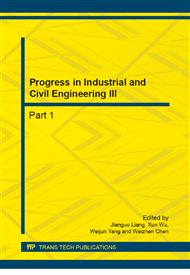p.2077
p.2082
p.2092
p.2097
p.2101
p.2106
p.2111
p.2116
p.2123
The Optimization Analysis of Hydraulic Junction Location of Three-Sources Branched Heat-Supply Network
Abstract:
In this paper, we shall first briefly introduce the hydraulic junction of three-sources branched heat-supply network and the related optimization method. It's difficult to guarantee that the system runs in optimal state and it increases energy consumption in the system. In view of this situation this paper proposes a method to find the optimal positions of hydraulic intersections based on analyzing a real heating system with three heat sources in Jining. The optimization objective is to minimize the electric power consumption of circulating water pumps in district heating system. Finally, optimization programs are designed and the optimized results verify the feasibility and validity of the method compared with conventional experience values.
Info:
Periodical:
Pages:
2101-2105
Citation:
Online since:
September 2014
Authors:
Price:
Сopyright:
© 2014 Trans Tech Publications Ltd. All Rights Reserved
Share:
Citation:


